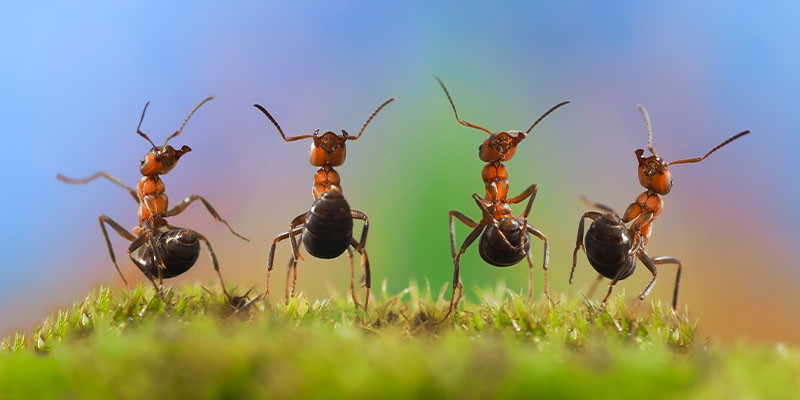You’re going about an average weekend day, preening the yard and cleaning up your landscape when you come across a line of ants impressively marching right along your lawn. Considering how organized these tiny creatures work in unison, it’s a remarkable sight. Awestruck, you take a moment to marvel at just how adept they truly are.
But, you’ve got work to do and you know those ants can’t be allowed to make their way into your home. Grabbing an insecticide and ready to strike, you pause and wonder, “Can ants feel pain?” Well, it’s a profound question with a complex set of answers. So, let’s take a look at how it breaks down.
Do Ants Feel Pain?
The world of insects is vast and complex, with ants being one of the most studied species due to their social structures and behaviors. However, one question that might intrigue scientists and the curious public is whether these tiny creatures can feel pain. Let’s take a closer look at this intriguing topic.
Understanding Pain in Animals
Before we can address whether ants feel pain, we need to define what pain is in the animal kingdom. Pain is generally considered an unpleasant sensory and emotional experience associated with actual or potential tissue damage. In humans, it’s a complex process involving both the nervous system and the brain.
The Ant’s Nervous System
Ants have a simple nervous system compared to vertebrates. They possess a brain and a ventral nerve cord, akin to a spinal cord, with ganglia (clusters of nerves) in each body segment. This system allows for basic sensory processing, coordination, and some form of learning and memory.
Do Ants Have Pain Receptors?
Ants do have nociceptors, which are sensory receptors that respond to potentially damaging stimuli by sending signals to the central nervous system. These receptors are similar to those found in many other animals, including humans. When an ant is exposed to heat, cold, or harm from predators, these receptors can detect the threat.
Behavioral Responses to Harm
Observations of ants’ behavior can provide clues about their perception of harm:
- Injury response. When injured, ants often engage in behaviors that might indicate an attempt to reduce discomfort or damage. For example, an ant might clean a wound or amputate a limb if it’s severely compromised—actions that suggest some form of sensory feedback akin to pain.
- Avoidance. Ants show avoidance behavior to stimuli that could cause injury, like heat or chemicals, suggesting they might perceive these as negative or harmful.
The Debate Over Insect Pain
The big question remains: is this response pain, or is it merely a reflex to avoid damage? Here’s where the debate gets nuanced:
- Lack of complex brain structures. Unlike mammals, ants don’t have brain structures like the neocortex, which in humans plays a significant role in the processing of pain and emotional responses to it. This absence leads some scientists to argue that what ants experience isn’t “pain” as we understand it but rather a direct stimulus-response mechanism.
Ethical considerations. If ants can feel pain, this has implications for how we treat them in research, pest control, and even daily life. Ethically, recognizing pain in insects might push for more humane practices.
Scientific Studies
There have been studies attempting to understand insect pain:
- Experiments with bees. Similar to ants, bees also show avoidance behaviors to harmful stimuli. Some researchers argue that this indicates a subjective experience of pain, although this is still controversial.
- Behavioral changes. Research has shown that when given the choice, insects avoid previously painful stimuli, which could suggest a form of memory linked to negative experiences.
-
While ants clearly respond to harmful stimuli, whether this constitutes “pain” in the human sense is still under debate. They lack the complex emotional and cognitive processing that accompanies human pain experiences, but their behavioral responses suggest they might have some form of sensory discomfort or aversion.
As science progresses, we might get closer to understanding the inner lives of insects. Until then, the question of whether ants feel pain remains a provocative mix of biology, ethics, and curiosity about the world’s smallest inhabitants.
How to Keep Ants Out of Your House
Now, we’ll get into a more practical matter and that is keeping ants out of your home. This involves a combination of preventive measures, regular maintenance, and sometimes, direct intervention. Different species might require different strategies. For instance, carpenter ants require different handling than sugar ants. Overuse can be harmful to health and the environment, and some ants might just move to another part of your home. Here’s what you can do:
- Cleanliness. Keep your kitchen and dining areas clean. Wipe down surfaces to remove crumbs and spills. Ants are attracted to even the tiniest food particles
- Store food properly, Use airtight containers for storing food, especially sweets, grains, and pet food. Ensure trash bins are sealed and emptied regularly.
- Manage pet food. Only leave pet food out during feeding times, then store it securely.
- Fix leaks. Repair any leaky faucets or pipes. Ants are attracted to moisture.
- Dry surfaces. Ensure areas like under sinks, around dishwashers, and near plants are kept dry.
- Caulk and seal. Use silicone caulk to seal cracks and crevices around windows, doors, baseboards, and where utilities enter the home.
- Weatherstripping. Install or replace weatherstripping around doors to prevent ants from entering.
- Trim vegetation. Keep branches and leaves away from the home’s exterior to reduce pathways for ants.
- Mulch and soil. Avoid piling mulch or soil against your home’s foundation, as this can attract ants.
- Vinegar. A vinegar and water solution can be sprayed in areas where ants enter or travel. The smell disrupts their scent trails.
- Lemon juice. Similar to vinegar, lemon juice can deter ants.
- Essential oils. Peppermint, tea tree oil, or citrus oils can be used to create a barrier ants are reluctant to cross.
- Bait stations. Use ant baits, which ants take back to their colony, potentially eliminating the nest. Place these near entry points or where ants are seen.
- Insecticides. For severe infestations, consider safe, targeted insecticides like boric acid, but use with caution around children and pets. Always follow label instructions.
If the infestation is overwhelming or if you’re unsure about handling chemicals, hiring a professional can ensure the problem is addressed effectively. They can identify the ant species and use the most appropriate treatment.
If you suspect an ant problem in your home or place of business, don’t hesitate to give us a call. Trad’s Pest Control is a leading provider in the Jacksonville area and our skilled technicians know how to deal with ants, and many other types of intruders. Just get in touch and your convenience and we’ll take it from there!

